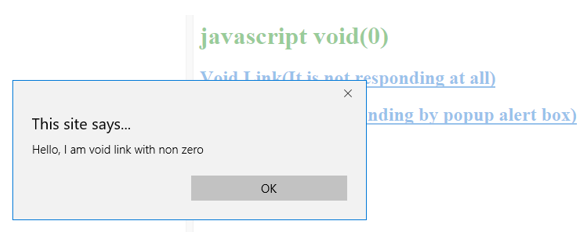Updated October 12, 2023

Introduction to Javascript void (0)
Void means completely empty. In JavaScript, the void is an operator used when the function does not return anything. It means the void result is undefined. In Java, if we do not specify any return type, that function or method automatically becomes void. But JavaScript is not a typed checking language. So, the function always returns something. In some situations, we do not need to return anything, so we must specify the void operator in front of the function.
Real-time Example: Overcome side effects while inserting any expressions into a web page; we might have used JavaScript:void(0).
How does the Void operator work in JavaScript?
Not returning function in JavaScript always works with a void operator.
Syntax:
void function functionName()
{
//code
}Above syntax inside implementation:
function functionName()
{
return undefined;
}While not refreshing and immovable links from page to page, use the void operator. This is always used with links.
Syntax:
<a href="JavaScript:void(0);"/>Examples
Here are the following examples mentioned below
Example #1 – Void operator with function(without parameters)
Code:
<!DOCTYPE html>
<html>
<head>
<title>Void</title>
</head>
<body>
<font color="green">
<h1>Void operator with function Even numbers</h1>
</font>
<script>
void function getEvenNumbers()
{
document.write("Even numbers from 1 to 10=><br>");
for(let i=0;i<=10;i++)
{
if(i%2==0&&i!=0)
document.write(i+"<br>")
}
}();
</script>
</body>
</html>Output:
Explanation:
As we can see above, the function has no chance to return anything, as it is a void function.
Example #2 – Void operator with function(with parameters)
Code:
<!DOCTYPE html>
<html>
<head>
<title>Void</title>
</head>
<body>
<font color="green">
<h1>Void operator with function Rectangle Area</h1>
</font>
<script>
void function getAreaOfRectangle(length,breadth)
{
var area=length*breadth;
document.write(length+": length and "+ breadth+" : breadth of area is ="+area);
}(20,25);
</script>
</body>
</html>Output:
Explanation:
As we can see, the above code, even passing with arguments, also function not return anything because of the void operator.
Example #3 – Void operator with numbers
Code:
<!DOCTYPE html>
<html>
<head>
<title>Void</title>
</head>
<body>
<font color="green">
<h1>Void operator with Numbers</h1>
</font>
<script>
function getNumbers(x,y,z)
{
x=void(y,z);
document.write("x value : "+x+"<br> y value : "+y+"<br> z value: "+z);
}
getNumbers(1,2,3);
</script>
</body>
</html>Output:
Explanation
- As we can see, y and z values are not changed because the results of y and z are not void.
- Whereas x has the resultant of the void operator with y and z. So, the result of x will become undefined.
- It proves void resultant always undefined primitive value.
Example #4
Code:
<!DOCTYPE html>
<html>
<head>
<title>Void</title>
</head>
<body>
<font color="green">
<h1>javascript void(0)</h1>
</font>
<h2>
<a href="javascript:void(0);">
Void Link(It is not responding at all)
</a>
</h2>
<h2>
<a href="javascript:void(alert('Hello, I am void link with non zero'));">
Void Link(It is responding by popup alert box)
</a>
</h2>
</body>
</html>Output before pressing any link:
Output after pressing the second link:
Explanation
- When we press javascript:void(0) link(1st link), it does not work at all because it returns void(0)
- When we press the javascript:void(alert()) link(2nd link), it opens an alert popup box with some message.
- It concludes void(0) does not open any link.
Conclusion
The void operator is used when the function does not return anything, whenever it wants to return an undefined primitive value and not usable links defined by javascript:void(0).
Recommended Articles
This is a guide to Javascript void. Here we discuss How does it work and give a few examples respectively. You may also have a look at the following articles to learn more –






